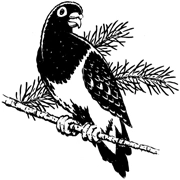Renni the Rescuer
PART I

Chapter I
WE SHALL CALL HIM RENNI,” said the man who raised shepherd dogs, as he took the puppy out of the basket, away from his mother. The old dog raised her head a little and followed her small son with a look of patient resignation.
This was good-bye, and she knew it. But she lay down quietly again and went to sleep—or seemed to go to sleep.
It was not for a dog to resist. She knew that, too. She was trustful and obedient.
To be sure, she still had three of the six puppies, out of the litter born a few days ago. Two had already been taken from her and now the third was going.
The three who were left pressed close against their mother as though asleep and dreaming, but drank eagerly. It gave the mother a feeling of comfort and well-being, and more and more the twilight of drowsiness stole over her.
The man went on speaking. “The last one I give away I always call Renni. I got rid of two yesterday so I won’t need to drown any of them. That would be a pity, but I never raise more than three. It keeps the mother in good health and the puppies grow up strong and bright.”
Once upon a time in the days of peace this man Vogg had lived near the Adriatic and had raised fox terriers. But after the first World War the confusion of politics and geography had made him very dissatisfied, for he was beginning to grow old, and in the new order of things he found no order at all. Since he could not accustom himself to surroundings which had become uncongenial he had moved northward and settled in a country which had been spared the alarms of war and had remained unchanged. He did not like changes.
He did not take into account that he had changed his own residence. And the fact that he was now raising shepherd dogs instead of terriers hardly seemed a change. He was still raising dogs, as he had always done. He had a kennel, and so life went on much as it had gone on before.
It was time anyhow to stop breeding fox terriers; there were too many of them. They had become commonplace, ladies’ playthings, almost a kind of toilet article; they were inbred and too apt to go mad. So he began to raise shepherds—more commonly known as “police dogs”—a breed he loved and understood. He could not live without dogs.
“Now, of course, you will have to feed him with a bottle for several weeks,” the man said to George, “and then he may have rice cooked in milk. You must raise him to like vegetables and fruit. Mix a little bone meal with his food, and for the first year go easy with meat.”
George smiled and took the tiny Renni in his arms. A sort of warm, milky fragrance rose from the basket where the mother lay with her children. A healthy dog-smell filled the whole kennel.
“I’m not going to give you his pedigree now,” said the man. “I’ll wait and see how Renni turns out.”
“Why should I have a pedigree?”
George pressed the little brown-black bundle of wool against him and Renni gave a soft whimper. It was a thin and tiny sound, almost like the twittering of a bird. He seemed to be feebly seeking something. George stuck his finger into the puppy’s mouth, and felt the hot, thirsty, eager sucking. It made him happy.
“I’ve always wanted a dog,” he said. “Thank you.”
“Don’t forget, his name is Renni,” Vogg called after him.
“Renni, good old Renni,” George kept saying on the way home, and there was a world of love in his tone.
George was a sturdy, good-natured fellow not yet thirty.
1 comment